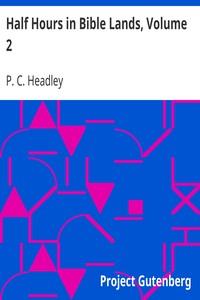|
|
Read this ebook for free! No credit card needed, absolutely nothing to pay.Words: 21831 in 7 pages
This is an ebook sharing website. You can read the uploaded ebooks for free here. No credit cards needed, nothing to pay. If you want to own a digital copy of the ebook, or want to read offline with your favorite ebook-reader, then you can choose to buy and download the ebook.

: Half Hours in Bible Lands Volume 2 Patriarchs Kings and Kingdoms by Headley P C Phineas Camp - Bible Biography@FreeBooksWed 07 Jun, 2023 ose up, and laid The wood upon the altar. All was done, He stood a moment--and a deep, quick flush Passed o'er his countenance; and then he nerved His spirit with a bitter strength, and spoke-- 'Isaac! my only son'--the boy looked up, And Abraham turned his face away, and wept. 'Where is the lamb, my father?' O, the tones, The sweet, the thrilling music of a child! How it doth agonize at such an hour! It was the last, deep struggle--Abraham held His loved, his beautiful, his only son, And lifted up his arm, and called on God And lo! God's angel staid him--and he fell Upon his face and wept." The years fled, the good old Abraham died, and Isaac succeeded him to the patriarchal honors. He had two sons, Esau and Jacob. The elder brother was irreligious, and married a heathen wife. God had rejected him, and promised to Jacob the birthright; in other words, he was to be the chief patriarch, through whose descendants the Messiah should come. He was his mother's favorite boy, while Isaac clung to Esau. When the fond father became weak and blind from age, feeling that death was near, one day he called Esau, and told him as he might die suddenly, to get him venison, and prepare for the solemn occasion of receiving his parting blessing, which should secure the privileges and pre-eminence of the first-born. The hunter went into the fields, and Rebekah recollected that Jacob had purchased the birthright of his brother for a mess of pottage one day when he came in from the chase faint with hunger and exhaustion. She determined by a stroke of management to secure the patriarchal benediction. She sent him to the flocks after two kids, which were prepared with the savory delicacy his father loved, dressed him up in Esau's apparel, covering his hands and neck to imitate the hairiness of the rightful heir, and sent him to the beside of the dying Isaac. When the patriarch inquired who he was, he replied, "I am Esau, thy first-born." This was beyond belief, because even the skillful hunter could scarcely, without a miracle, so soon bring in the game, and dress it for his table. Jacob was called to his side, and he felt of his hands; the disguise completed the delusion, although his voice had the milder tone of the young shepherd to that father's ear. He repeated the interrogation concerning his name, then embracing him, pronounced in a strain of true poetry, the perpetual blessing of Jehovah's favor upon his undertakings, and his posterity. The stratagem had succeeded, and Jacob hastened to inform his mother of the victory, just as Esau entered. When Isaac discovered the mistake, he trembled with excitement, while his son cried in anguish, "Bless even me also, O my father!" That cry pierced the breaking heart of the aged man, but it was a fruitless lament, He was inflexible, and Esau wept aloud over his blasted hopes; plotting at the same time, in his awakened enmity, the murder of Jacob. This scene of deception, disappointment, and providential working, the introductory picture brings vividly before us. The patriarchs were generally shepherds, and when we read in the Bible of shepherds, we have but a poor impression of their business, if we think only of the keeping of the small flocks kept in the fenced fields and yards of modern farmers. They made their wealth chiefly by feeding immense flocks and herds. They had extensive open plains; and were obliged to watch the animals to prevent their being lost, stolen by robbers, or devoured by ferocious beasts. When it was at all safe, the shepherds and their flocks slept in the fields, beneath the open sky, or under the sheltering trees. If the country was infested by dangerous men or animals, the owners of the flocks built the fold or sheep-cote. This enclosure was sometimes merely a rude pen. The walls were of wood or stone, with a thatched roof--if they had any at all. The shepherd follows a wayward sheep, and brings him back to a place of safety. Thus the Good Shepherd of souls, whose disciples, like the flocks of the East, "know his voice," with his rod of affliction restrains the wandering and keeps securely the trusting ones. Occasionally a rich land owner would make an expensive fold--a kind of town or fortress for his flocks. Keeping the sheep in the air, it was believed improved the texture of the wool, making it softer and firmer than when exposed to the sweating and vapors which would necessarily result from crowding them often and long into enclosures. Abraham, Isaac, and Jacob, were among the richest shepherds of antiquity, and stand alone in moral grandeur of character, so far as we have any records of the Hebrew husbandmen. The great enemy of the sheep the world over, is the wolf--a cunning, savage, and daring creature. A lamb of the flock seems to be a dainty feast for him. He relishes even a child; the human delicacy is quite as delicious as the other. A mother, with three children, was once riding in a sledge in a desolate region, when a pack of wolves came running after her. She drove rapidly on, but they came nearer and nearer, until their hot breath fell on her face. In her terror, she threw one of the children to the hungry wolves, hoping thus to pacify or check them until she could get out of their reach. Soon, however, they came galloping on, surrounding her sledge, and she flung another upon the snow. A brief delay, and they were once more around her, and the last child was given to the beasts; and then she reached her home in safety. When she told the story to her neighbors, an exasperated peasant hewed her down with an axe, because she fed the wolves on her own offspring, selfishly saving by the sacrifice, her own life. How like the destroyers of human virtue, and the great destroyer himself! Wolves in sheep's clothing, stealing upon unguarded victims, and glorying in the destruction of all that is "lovely and of good report." for the transitory present and endless future! Free books android app tbrJar TBR JAR Read Free books online gutenberg More posts by @FreeBooks
: Punch or the London Charivari Volume 93 August 13 1887 by Various Burnand F C Francis Cowley Editor - English wit and humor Periodicals Punch@FreeBooksWed 07 Jun, 2023
|
Terms of Use Stock Market News! © gutenberg.org.in2025 All Rights reserved.






